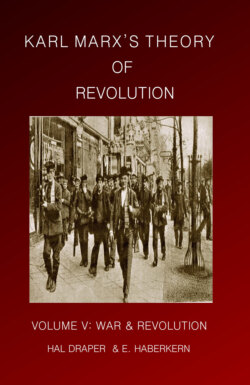Читать книгу Karl Marx’s Theory of Revolution Vol V - Hal Draper - Страница 11
На сайте Литреса книга снята с продажи.
5. Two Barking Dogs
ОглавлениеThere is a Sherlock Holmes story in which a key piece of evidence, overlooked, of course, by the bumbling Dr. Watson, is something that is missing. A dog didn’t bark when it should have. In the case we are investigating, practically all participants played the role of Watson. Only, they had less excuse. It wasn’t that the dog didn’t bark; it was that there were two dogs, both barking loudly, and no one noticed them. Neither Kautsky, nor Potresov, nor Lenin, nor, as far as I have been able to determine, any other socialist during Word War I, cited the two wars after 1848 in which Marx and Engels unambiguously took a prowar stand in support of a bourgeois government.
During the American Civil War, Marx actively campaigned for the Union. His support was unconditional and unqualified. He did not ask himself which side’s victory would be “most desirable.” He came down solidly on the side that was fighting slavery. His activity was not only literary. A significant section of the British bourgeoisie, led by Gladstone’s liberals, favored an alliance with the Confederacy. Marx, together with his friends in the movement, mostly ex-Chartists, carried on a counter campaign, organizing rallies and meetings in support of the Union. Given the economic crisis created in the textile industry by the Union blockade of cotton exports from the slave-holding South, England’s main supplier, this campaign by Marx and the former Chartist leaders required a confrontation with conservative trade unionists in what was a relatively well-organized trade. But Marx’s support of the Union, while unqualified, was not uncritical. The conduct of the war by the Lincoln administration was pilloried in Marx and Engels’ correspondence and their public comments, while more restrained, were also harsh.13
Even more surprising is the failure of any of the participants in the 1914 debates to make much of Engels’ extensive writings on the Franco-Prussian war in The Pall Mall Gazette. From the fall of the Second Empire in September of 1870 up to the insurrection of the Paris Commune in March of the following year, Engels wrote as an outspoken partisan of the bourgeois Third Republic. And Marx used all his influence in the IWMA to swing that organization into the pro-Republican camp. Here again, from the beginning, neither Marx nor Engels held any illusions about the bourgeoisie. They predicted its betrayal of the working classes before the insurrection in Paris even broke out. And this skeptical assessment of the bourgeoisie as a class, and of its political leaders, radically shaped the policy they advocated. But their support for this Republican government, which was soon to ally itself with the Prussians to crush the Commune, was unqualified as long as it fought against the Prussians and for the Republic. What “support” for one side in a war meant for Marx is illustrated by these cases; it was of no use for socialists who, like Potresov, were arguing for a policy of social peace in World War I. It should be obvious why this was so. Any comparison of Kaiser Wilhelm, Emperor Franz Joseph, Tsar Nicholas, or even the politicians of the Third Republic to Abraham Lincoln, let alone the American abolitionists, would have been ridiculous. The comparison itself would have highlighted the demagogy behind the claim of any of the former to be fighting for “freedom.” What is more to the point, Marx’s support for the union side militarily in that conflict took the form of political opposition to the Lincoln administration’s handling of the war. And the same distinction was made in his support of the Third Republic.
